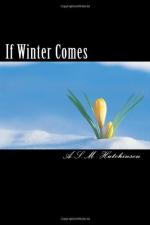The houses of Penny Green carried out the Kate Greenaway effect that the Green itself established. Along the upper road of the tilted dish were the larger houses, and upon the lower road mostly the cottages of the villagers; also upon the lower road the five shops of Penny Green: the butcher’s shop which was opened on Tuesdays and Fridays by a butcher who came in from Tidborough with a spanking horse in front of him and half a week’s supply of meat behind and beneath him; the grocer’s shop and the draper’s shop which, like enormous affairs in London, were also a large number of other shops but, unlike the London affairs, dispensed them all within the one shop and over the one counter. In the grocer’s shop you could be handed into one hand a pound of tea and into the other a pair of boots, a convenience which, after all, is not to be had in all Oxford Street. The draper’s shop, carrying the principle further, would not only dress you; post-office you; linoleum, rug and wall paper you; ink, pencil and note paper you; but would also bury you and tombstone you, a solemnity which it was only called upon to perform for anybody about once in five years—Penny Green being long-lived—but was always ready and anxious to carry out. Indeed in the back room of his shop, the draper, Mr. Pinnock, had a coffin which he had been trying (as he said) “to work off” for twenty-two years. It represented Mr. Pinnock’s single and disastrous essay in sharp business. Two and twenty years earlier Old Wirk had been not only dying but “as good as dead.” Mr. Pinnock on a stock-replenishing excursion in Tidborough, had bought a coffin, at the undertaker’s, of a size to fit Old Wirk, and for the reason that, buying it then, he could convey it back on the wagon he had hired for the day and thus save carriage. He had brought it back, and the first person he had set eyes on in Penny Green was no other than Old Wirk himself, miraculously recovered and stubbornly downstairs and sunning at his door. The shock had nearly caused Mr. Pinnock to qualify for the coffin himself; but he had not, nor had any other inhabitant of suitable size since demised. Longer persons than Old Wirk had died, and much shorter and much stouter persons than Old Wirk had died. But the coffin had remained. Up-ended and neatly fitted with shelves, it served as a store cupboard, without a door, pending its proper use. But it was a terribly expensive store cupboard and it stood in Mr. Pinnock’s parlour as a gloomy monument to the folly of rash and hazardous speculation.




